Apple Watch vs Android Wear: which smartwatch is best?
The definitive Apple and Google watch comparison
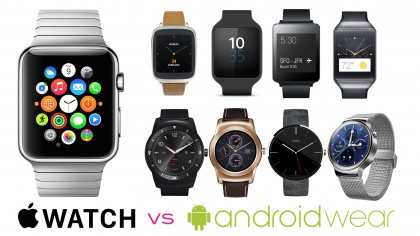
Which has the better watches and UI?
Chances are, if you're wearing a smartwatch by the end of this year, it's going to be made by Apple care of its Apple Watch or powered by Google's Android Wear platform.
There's also a very good chance you know which one is right for you based on the phone you already own. Apple Watch works with iOS 8 and Android Wear works with, you guessed it, Android.
However, as the Apple Watch pre-order begins, there's still an excellent debate as to which smartwatch delivers the best on-wrist experience: Apple's one smartwatch or Android Wear's many, many watches.
Now that the Apple Watch price has been announced and the "iWatch" tested on our wrists, we can finally make the inevitable Apple Watch vs Android Wear comparison.
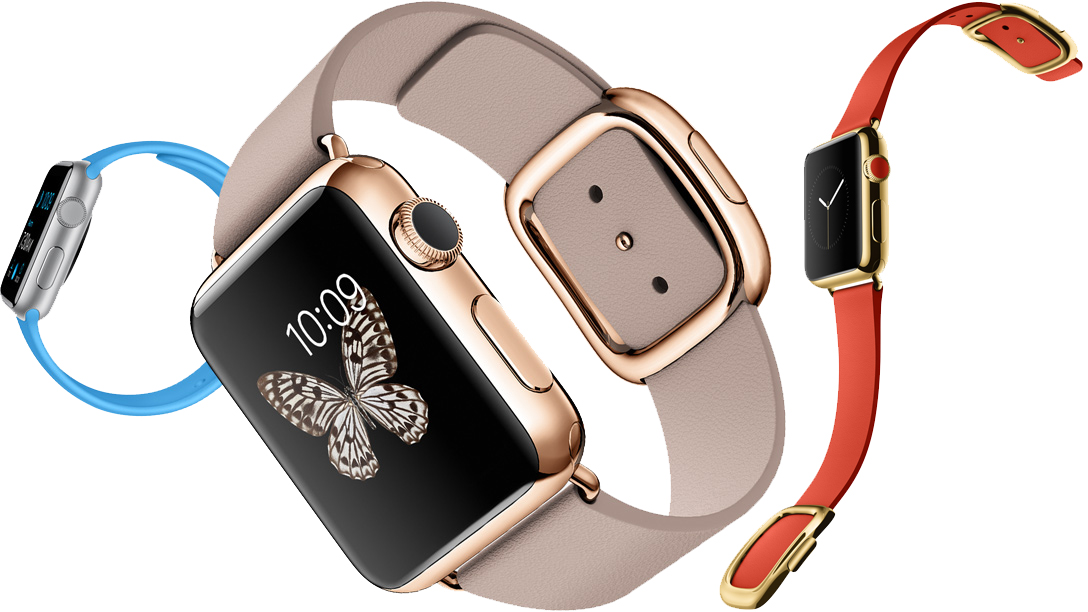
Design: Apple Watch
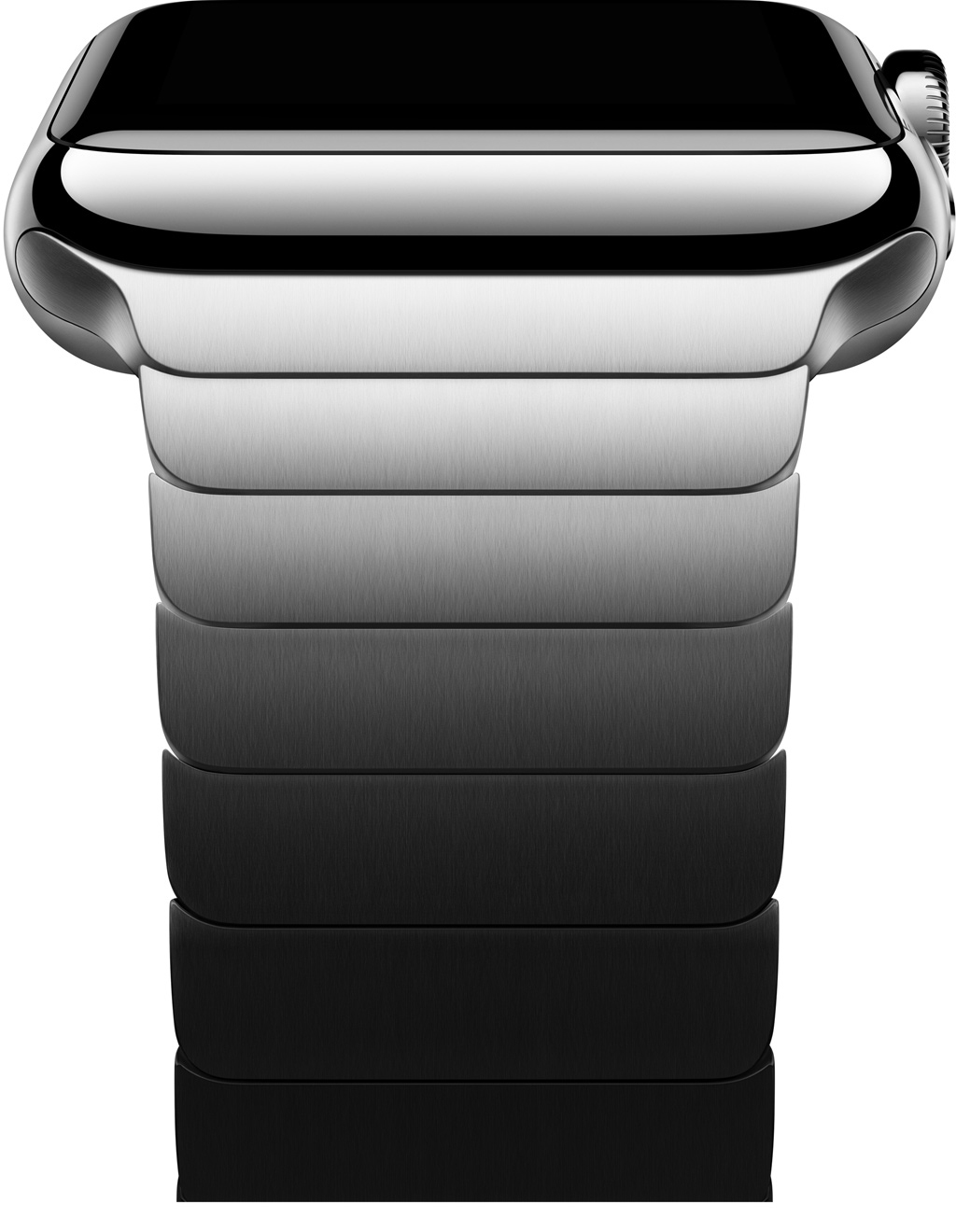
Smartwatches come in all shapes and sizes, while smartphones - with a few exceptions like the Samsung Galaxy S6 Edge and LG G Flex 2 - generally all look the same.
Apple Watch, for example, takes on a square shape with rounded off corners and three cases types: aluminum, stainless steel and the much-talked-about 18-karat gold Watch Edition.
Its two higher-end models feature scratch-resistant sapphire glass, while the entry-level Sport edition is protected by Ion-X glass. Apple considers both premium, of course.
There are two sizes in an effort to fit more wrists, a smaller watch with a 38mm height and a bigger timepiece with a 42mm height. This is something Android-based watches don't offer.
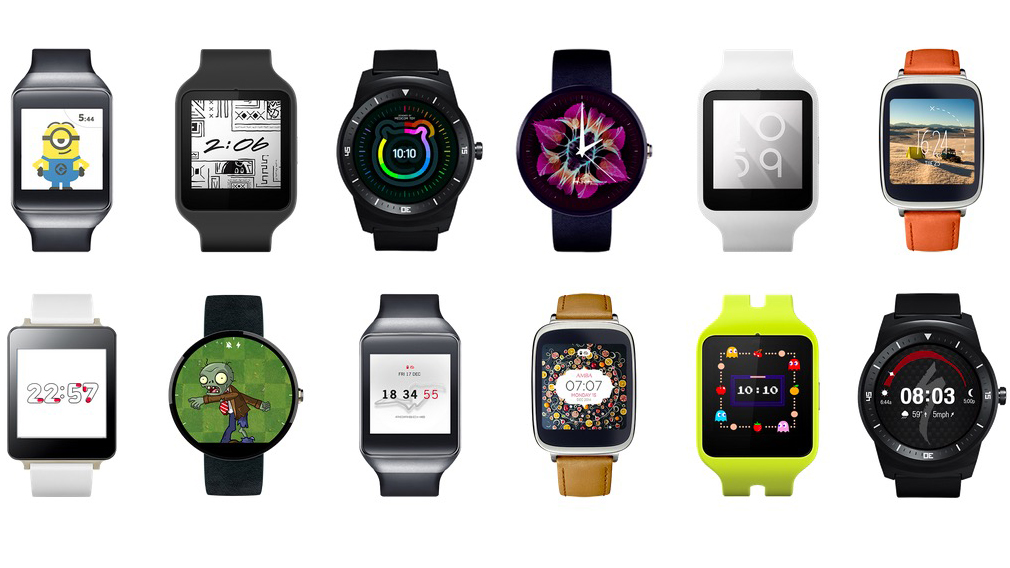
Design: Android Wear
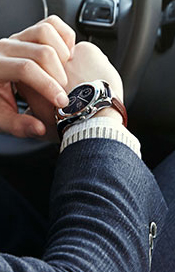
Android Wear watches add more variety with eight different designs so far. This includes the circular Moto 360, LG G Watch R, Huawei Watch and new LG Urbane.
There are also square-shaped Google-powered watches: Sony Smartwatch 3, LG G Watch and Samsung Gear Live. The Apple Watch-like Asus ZenWatch fits somewhere in between.
In total, there are now eight Android Wear watches and they've come a long way from their "plastic disguised as metal" beginnings.
Huawei and LG's forthcoming watches are made of stainless steel with fancier silver and gold tones, catching up with Motorola and its customizable timepiece.

Display: Apple Watch
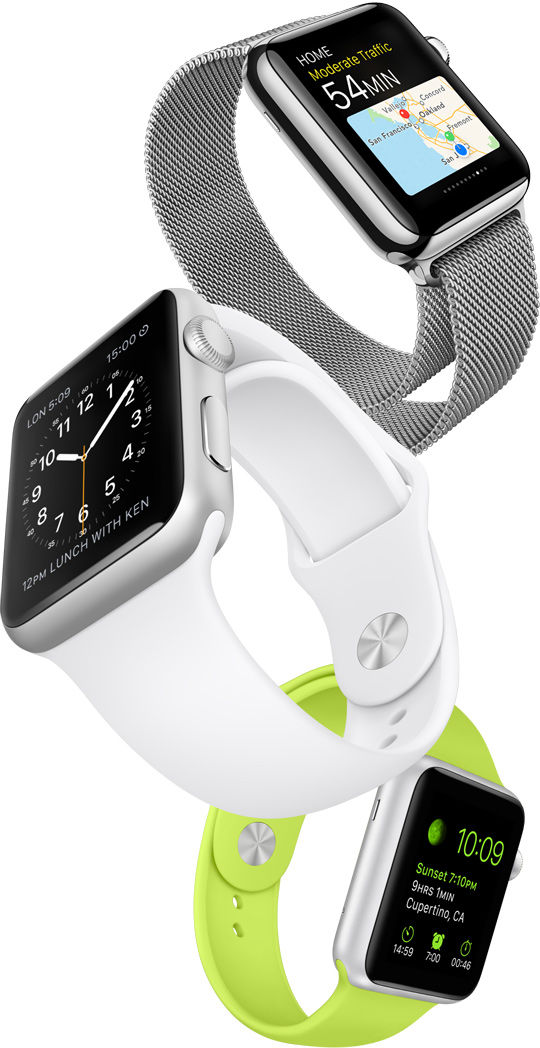
Apple Watch's display size is rather small, but its resolution is still pixel-dense enough to earn that "Retina" marketing label.
The colorful OLED screen reaches a resolution of 312 x 390 on the 42mm watch size and 272 x 340 on the 38mm watch size.
Apple Watch's display has its own "one more thing" you don't see right away. Its pressure sensitive with technology the company calls "Force Touch."
This means the flexible screen can sense differences between light taps and deep presses, which solves complex UI commands sans Multitouch. Sounds expensive, hence the Apple Watch price.
Force Touch is also a part of the New MacBook, launching along with the Apple Watch pre-order, and we expect it from iPhone 7 too.
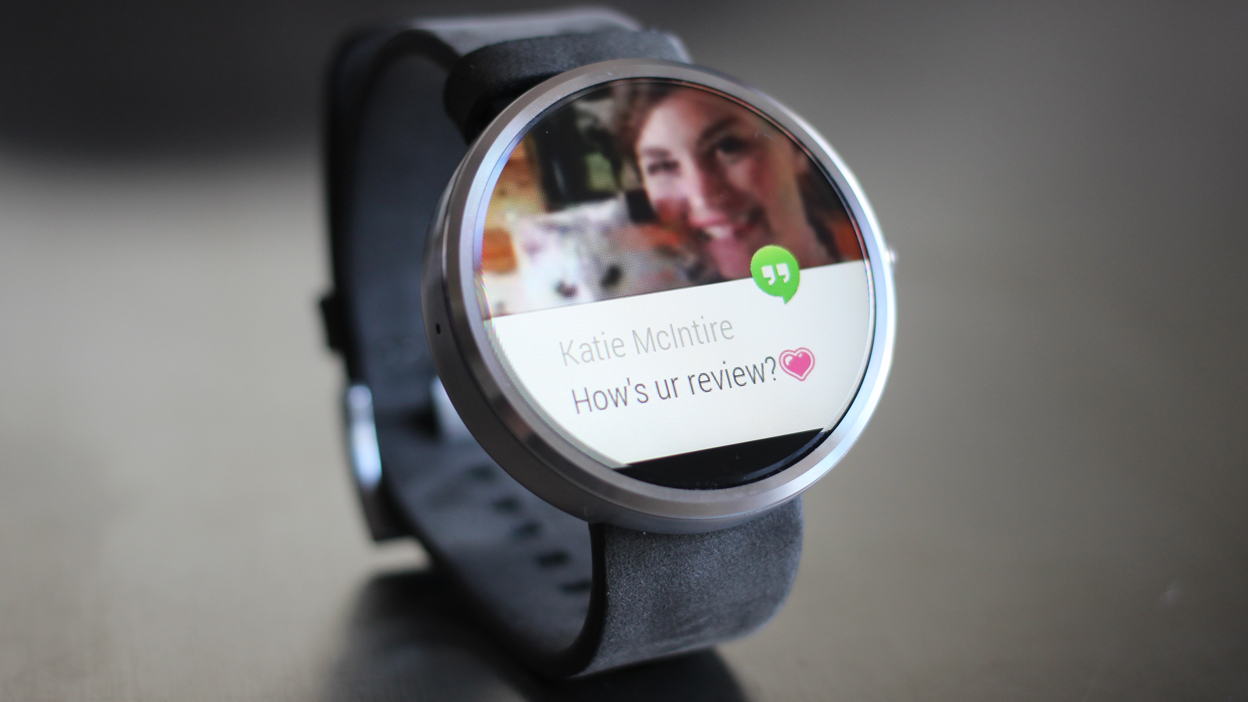
Display: Android Wear
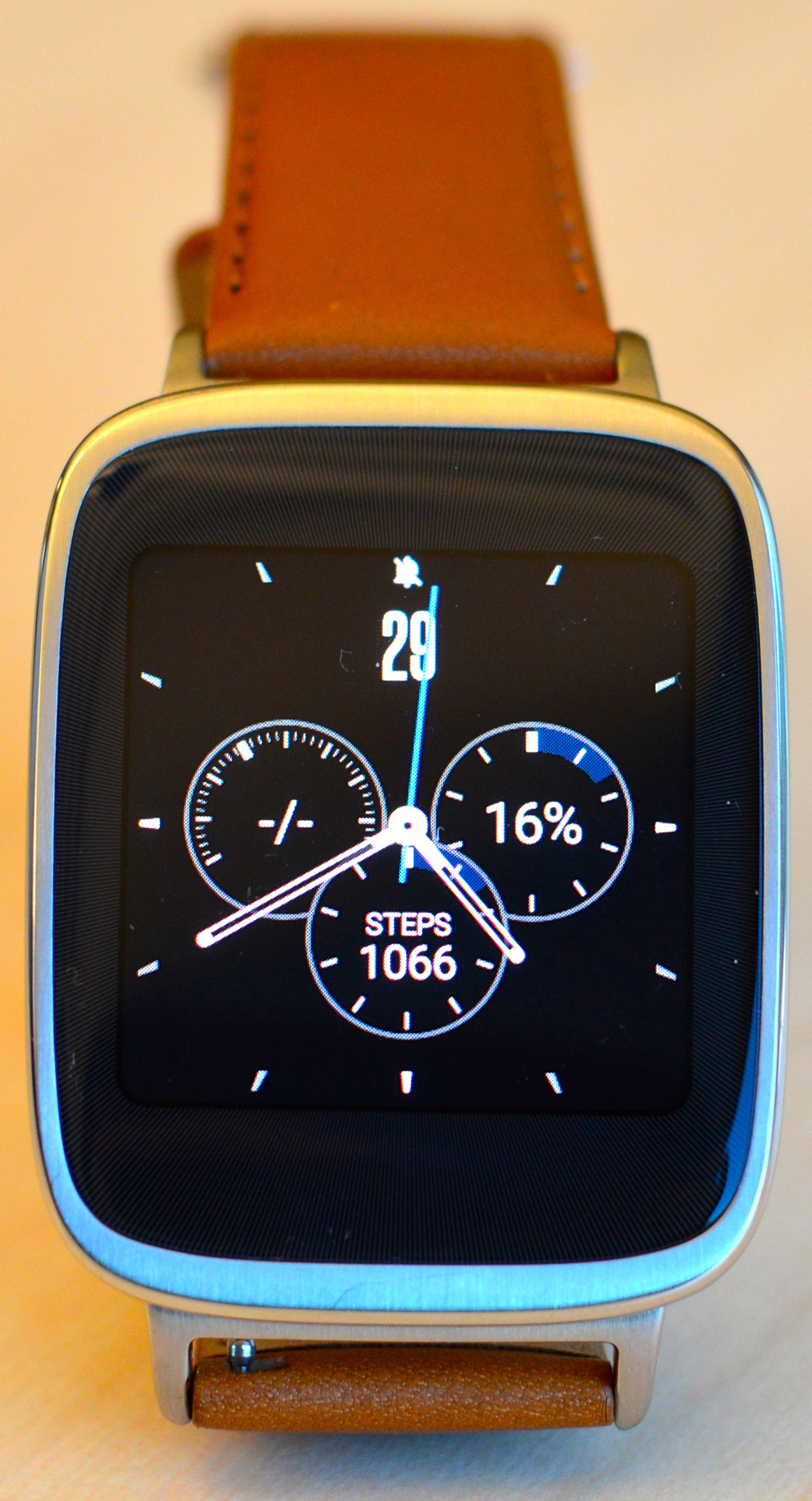
Android Wear's displays really brightened up smartwatches at a time when we were all fooling around with Pebble's black-and-white e-paper screen.
The current highest resolution displays come from Samsung, Sony and Asus watches thanks to 320 x 320 AMOLEDs and LCDs with 278 pixels per inch.
But even the Moto 360 looks good thanks to 280 x 280 and 240ppi. Its debut of a circular watch face tempted buyers to return or cancel their initial Gear Live and LG G Watch orders.
Google's software doesn't support anything like Apple's Force Touch at the moment, but that doesn't rule out future technology along those lines.
After all, Android Wear watches are already pushing smartwatch pixels to the next level. Huawei Watch promises a 400 x 400 resolution and 286ppi from a 1.4-inch round AMOLED.
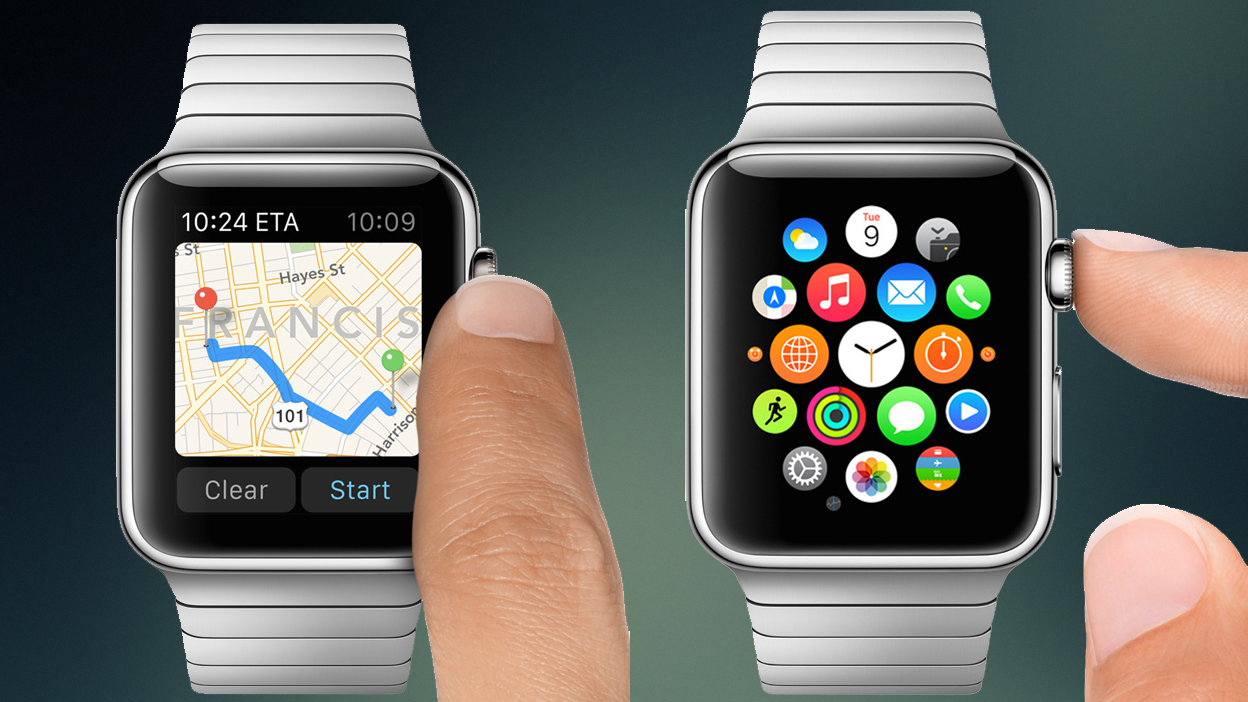
Controls: Apple Watch
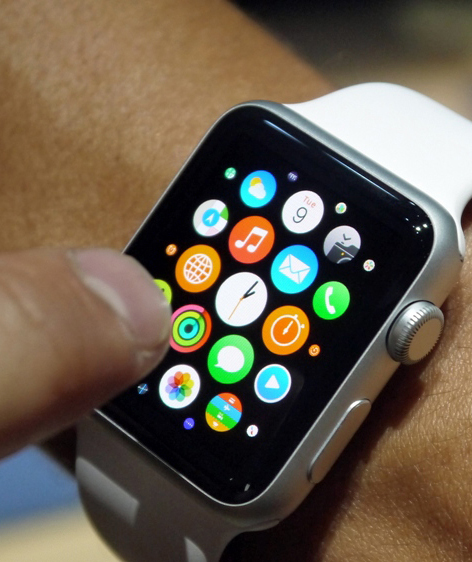
Apple Watch's Digital Crown isn't just a classic-looking knob: it's a unique way to interact with the interface without having to constantly swipe at a tiny screen.
Twisting this time-tested input magnifies content and scrolls through lists, and pressing it in returns home without obstructing the display. It's much better than swipe and pinch-to-zoom gestures on surface that's about 1.5 inches.
Tapping the larger side button underneath leads to your friends' thumbnails. This keeps your most frequent contacts within arm's reach so you can initiate a quick message or call.
Of course, the touchscreen is still utilized a lot, like for pressure-sensitive Force Touch, and Apple Watch wearers can exchange drawings, taps and heartbeats for added personalization.
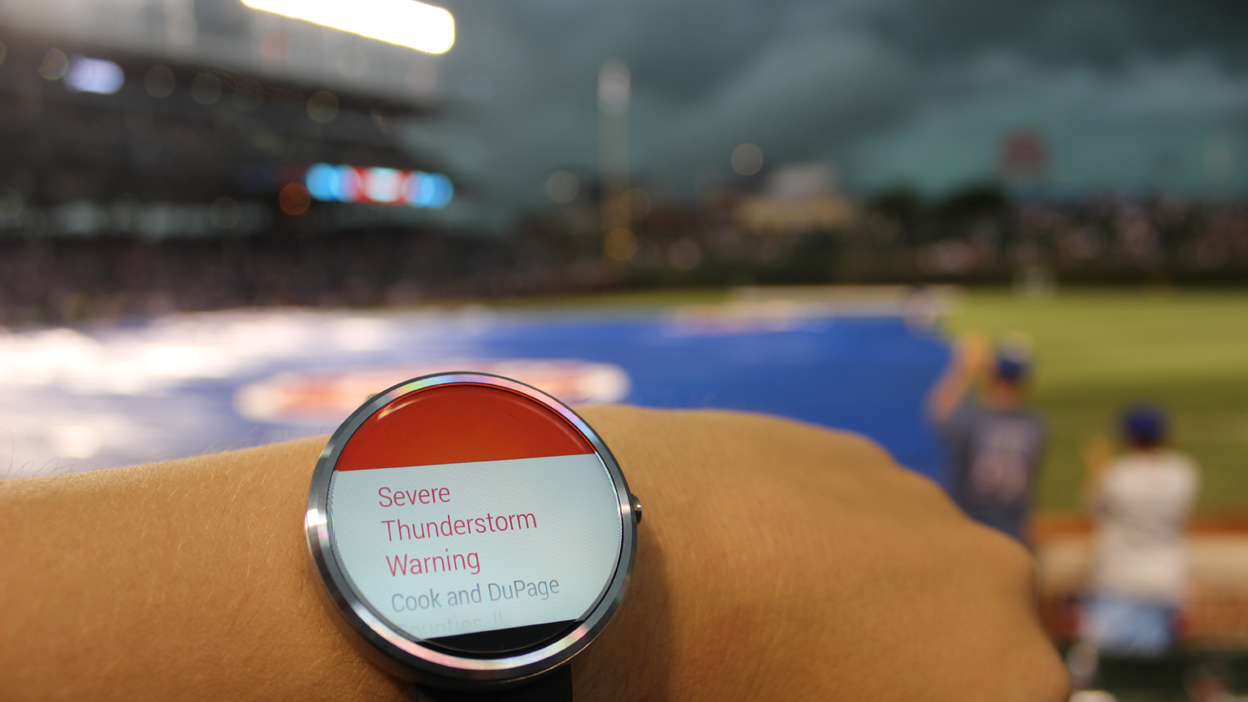
Android Wear: Controls
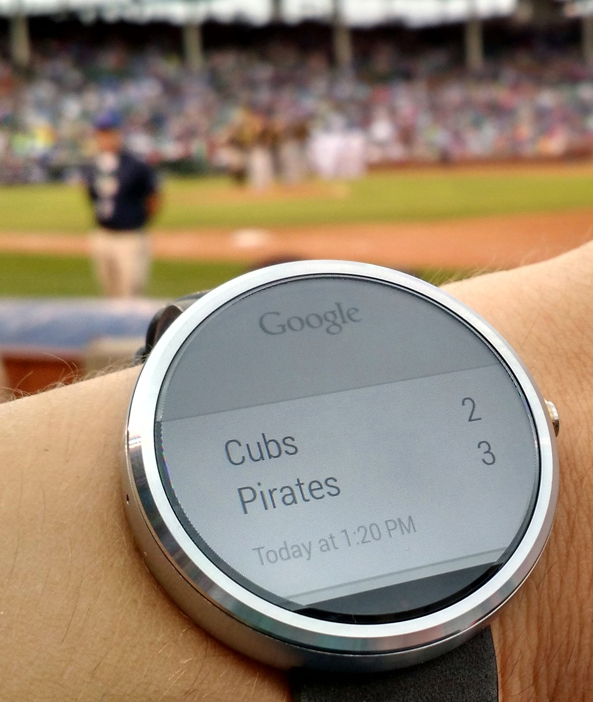
Android Wear's interface is primarily controlled with swiping, but a lot of the menus pop up automatically thanks to the know-it-all Google Now software.
The search engine giant's intelligent personal assistant dives into everything from your search history to your email to your calendar to surface relevant tips. It's creepy, but works so well.
"Were you looking for directions to the Chicago Cubs' stadium last night? Leave now to get there in time for this afternoon's game, and take this route," my Moto 360 reminded me during a trip in Chicago.
"Can't see the scoreboard at the stadium? Here's the real-time score. Oh, and watch out for that inclimate weather. It looks like a rain delay." Everyone else without a smartwatch got wet.
So yes, Android Wear watches rely heavily on swiping, even though most include a button on the watch case, but it's the controls inside that really turn the gears.
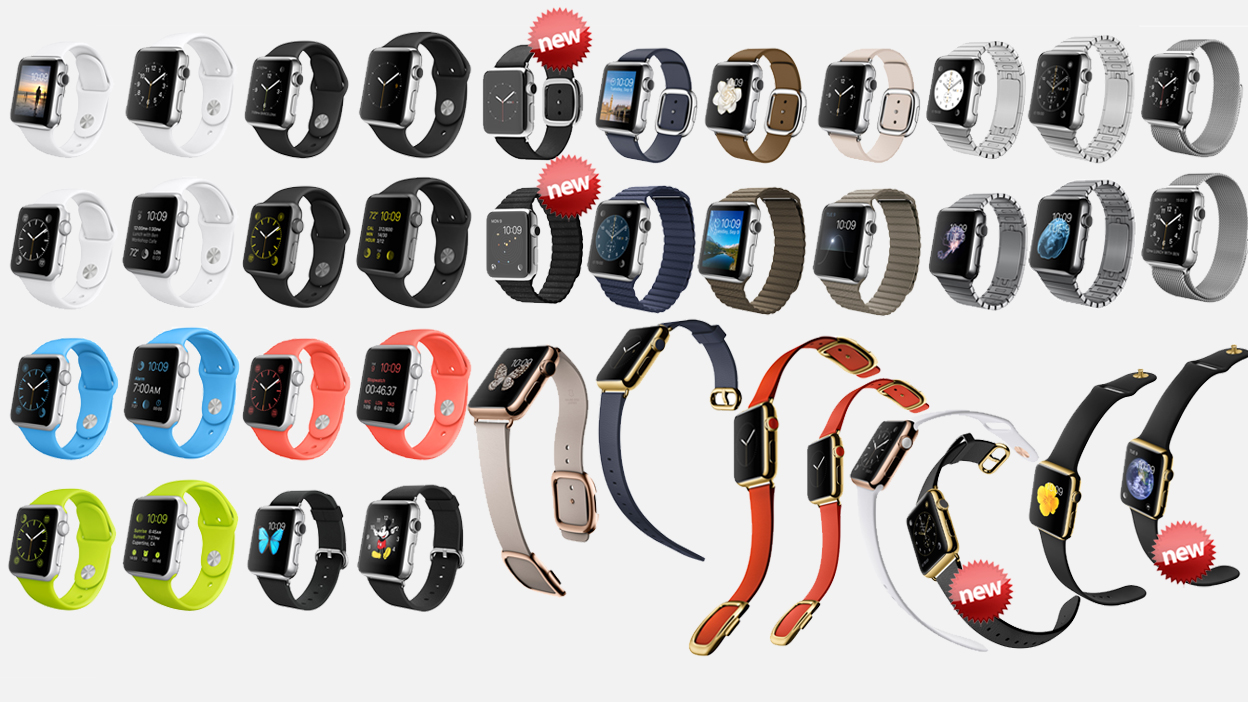
Straps: Apple Watch vs Android Wear
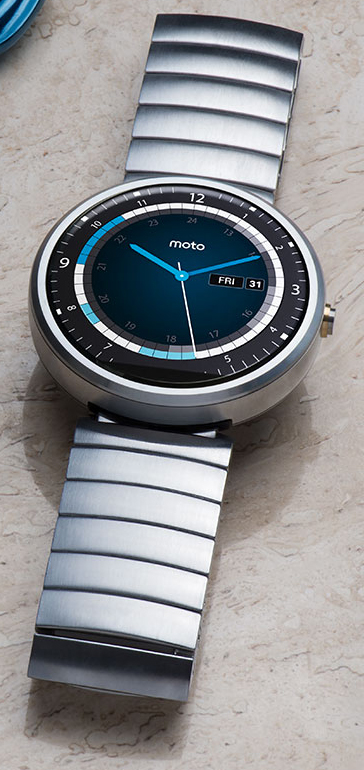
Smartwatch style doesn't stop with a stainless steel or gold watch cases. Straps add a little more personalization to these digital wrist huggers.
A total of 38 straps can accessorize your Apple Watch pre-order, from the "cheapest" rubber-like Sport Band to three different leather choices to the luxury gold and rose gold Watch Editions.
When it comes to Apple Watch's metal bands, the Link Bracelet contains over 100 parts and takes nine hours to make, increasing the Apple Watch price. The Milanese Loop is classy, too and is "infinitely adjustable."
Android Wear isn't without strap options. In fact, it's more customizable thanks to many watches supporting the standardized 22mm size for third-party bands vs Apple proprietary linkage.
Motorola makes watch building the easiest through its Moto Maker customization process that it shares with the Moto X smartphone. Users pick out a case color, band design and the watch face that greets them upon unboxing.
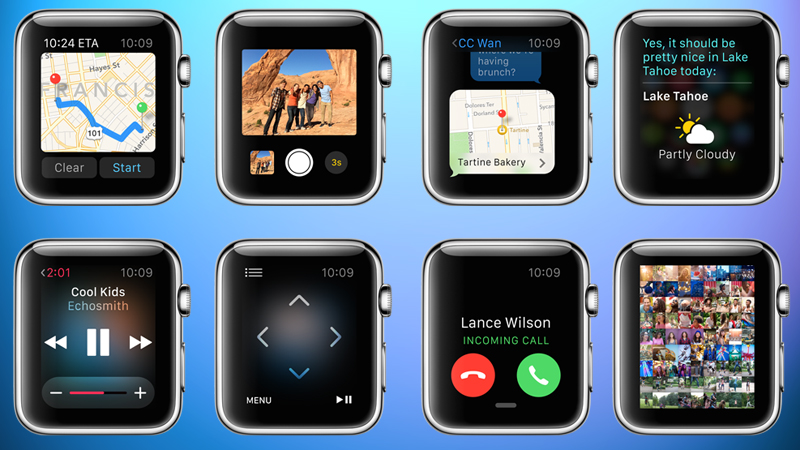
Apps: Apple Watch
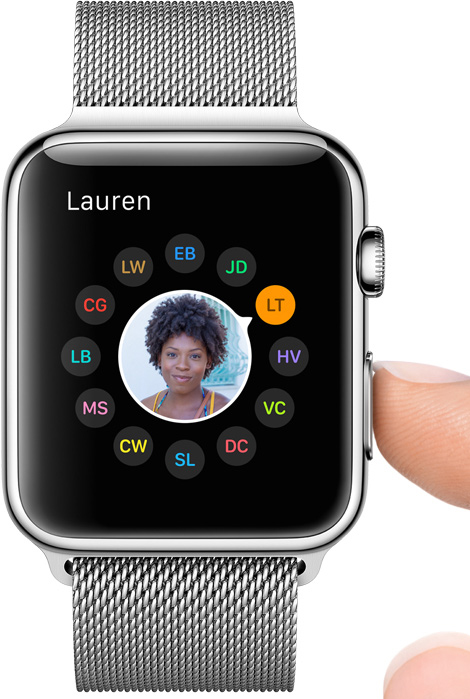
Apple Watch apps are imminent from developers armed with WatchKit, but before we get to download and test them out, we have a sense of how the built-in apps perform.
The 20 default apps from Apple best showcase the iPhone-compatible watch's ability to see information at a glance and respond casually.
Messages, phone calls and Mail are beamed to the wrist with various ways to answer. I really like the ability to shoot my current location to a friend who asks, "Where are you at?"
Calendar keeps your appointments in check, and Activity and Workout keep your fitness routine in check. Weather, Stocks and Photos let you plan your next moves, too.
Siri, Photos, Maps, Passbook complete with Apple Pay work like they do on the iPhone 6. Music, Camera Remote and Remote control songs, photo capturing and streaming content. Alarm, Stopwatch, Timer and World Clock round out the time-keeping apps.
There are many more third-party Apple Watch apps to come, and notifications from Facebook, Twitter, WhatsApp and every other app are pushed from the phone to the easier-to-access watch.
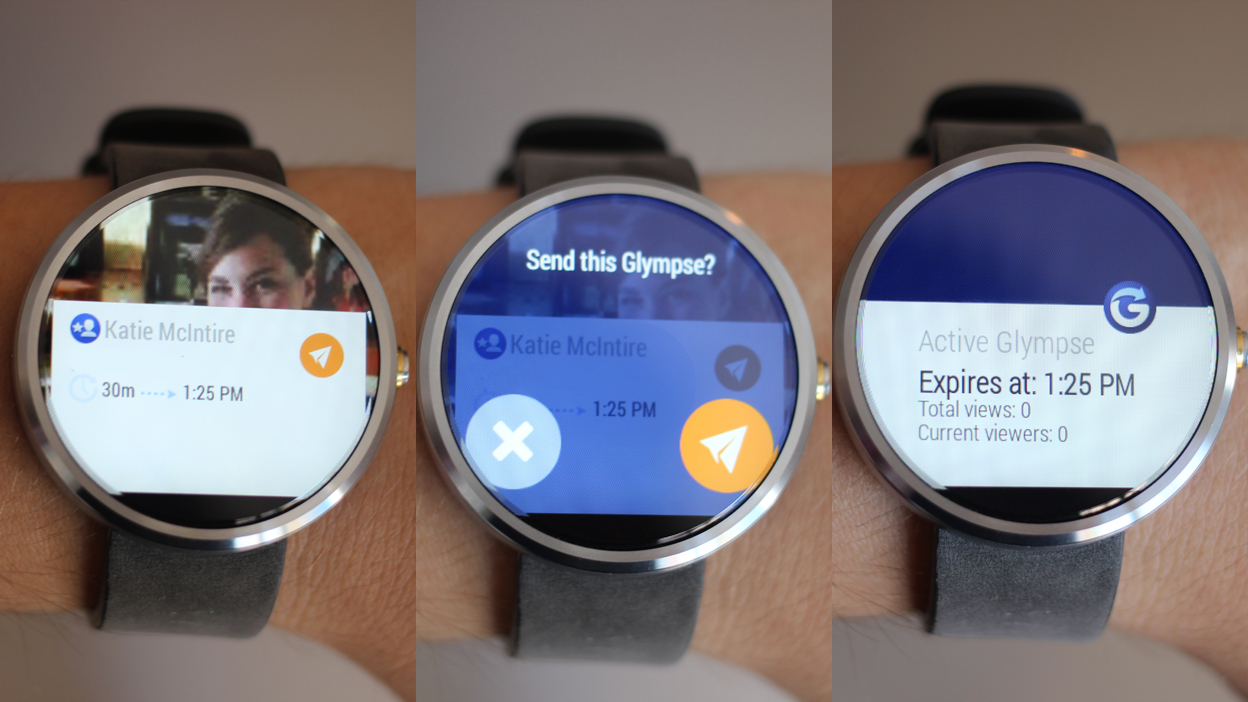
Apps: Android Wear
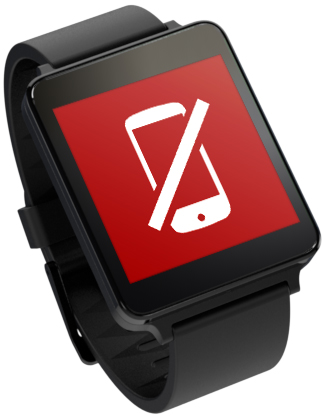
Google's smartwatch platform has had a little more time to make a home for app developers and it shows in the booming Play Store Android Wear section.
In fact, almost all of the apps Apple is planning are already available on Android Wear watches - Hangouts is here for all of your messages, Google Now surfaces appointments reliably and the Wear Camra Remote effectively snaps pictures from your phone.
Inventive apps from third-party developers like Wear Aware alerts me every time I leave home without my Android phone, triggering intense vibrations as soon as the Bluetooth connection is severed. I never leave home without my phone now.
Android Wear and Apple Watch seem to share all of the main apps except Google's watches can't yet answer phone calls from the wrist - not Dick Tracy-style anyway. Of course, not everyone wants that ability.
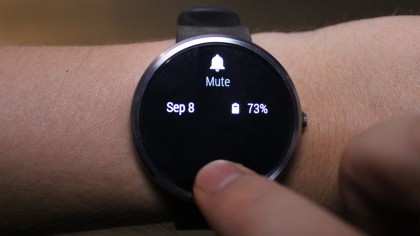
Battery life: Apple Watch vs Android Wear
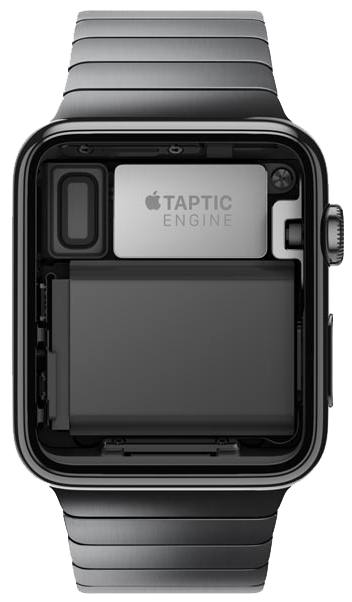
Plenty of Android Wear owners are saying, "Please! You keep that phone calls from the wrist" feature after noticing the Apple Watch battery life.
Apple CEO Tim Cook thinks it'll last 18 hours with normal use, which is technically a full day if you keep to a normal sleeping pattern. Charging it nightly is mandatory to keep it running.
Android Wear watches are only better in comparison. Moto 360 lasts 24 hours with a 320mAh battery. Sony Smartwatch 3 runs the longest - shy of two days - with a bigger 420mAh battery.
Does any smartwatch have good battery life outside of 18 to 40 hours? Absolutely. Pebble Time and Pebble Time Steel last seven days and a stellar 10 days with color e-paper displays.
Expect more juice in the future as the entire tech industry focuses on miniaturized smartwatch batteries, and as Apple and Google tinker with their still-relatively new software gears.
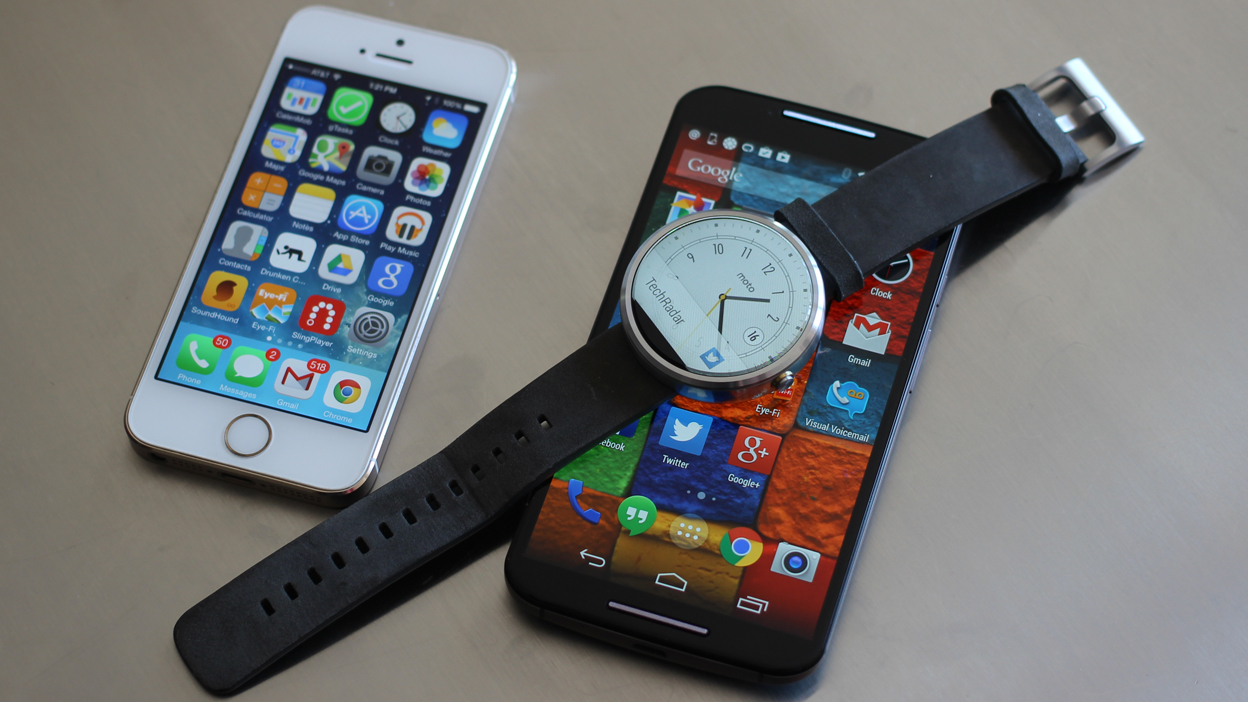
Compatibility: Apple Watch vs Android Wear
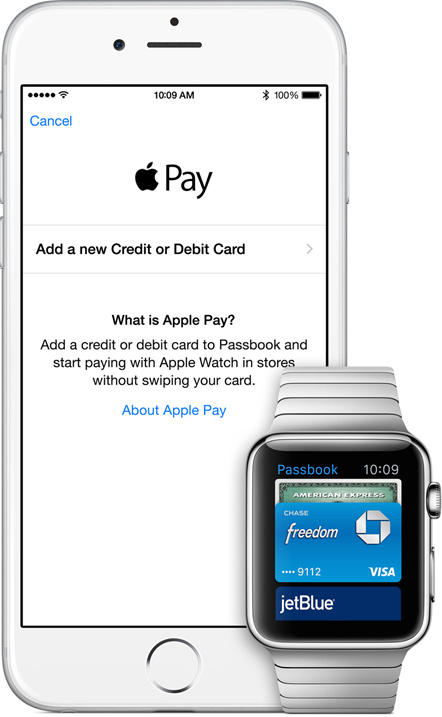
The battle lines between Apple Watch and Android Wear are clear. Apple's smartwatch only works with iPhone. There's no reason to make an Apple Watch pre-order if aren't on iOS. Likewise, Google's eight watches only work with Android phones.
Specifically, Apple Watch is compatible with iPhone 5, iPhone 5C, iPhone 6 and iPhone 6 Plus, so it's time to upgrade if you haven't already. iPhone 7 is a shoo in eventually.
Android Wear iPhone support is being worked on, but for now, its watches require phones to run Android 4.3, Android 4.4 or Android 5.0. It's not limited to certain handsets per say, but only certain phones and carriers have this version of Jelly Bean or newer.
Pebble Time and Pebble Time Steel work with iOS and Android. Will Apple Watch ever work with Android Wear? Very unlikely.
On the flipside, Google hasn't officially said anything about Android Wear watch compatibility for iOS, but it's said to be in some code. Time will tell.
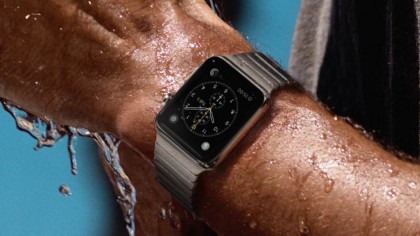
Waterproof: Apple Watch vs Android Wear
Both Apple Watch and Android Wear smartwatches are more water-resistant than waterproof. In other words, it's best not to submerge them in the swimming pool.
Apple Watch's IPX7 rating makes it waterproof up to 1 meter (3 feet) under water for 30 minutes, according to Apple. That makes it fit for the shower or a sweat-filled workout.
Android Wear watches range from a scarier IP55 (looking at you, delicate Asus ZenWatch) to IP68 thanks to the Sony Smartwatch 3. It can go 1.5 meters (4.9 feet) down for 30 minutes. That's not much of an improvement.
Once again, Pebble and Pebble Steel lead the way with better waterproof stats. It's so much better that they're on a different scale with a 5 ATM rating and have swimming apps. Pebble Time and Pebble Time Steel should match with at least 3 ATM.
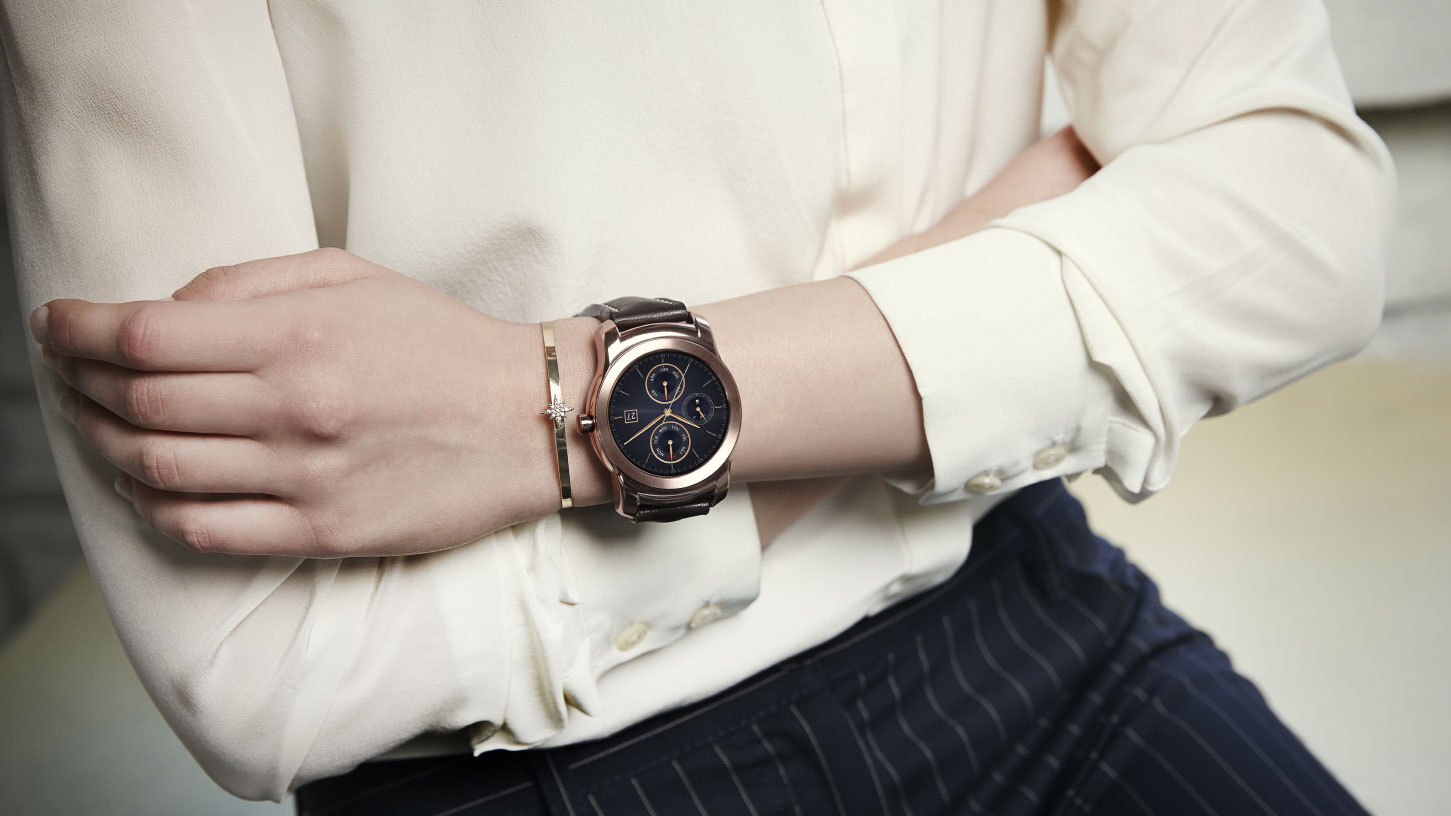
Price: Apple Watch vs Android Wear
Sometimes it just comes down to price, and this is where Apple wins big... and buyers lose.
The Apple Watch price starts at $349 (£299, $499), and that's for the aluminum 38mm case Sport Band without sapphire glass.
The tempting all-metal Link Bracelet, the one that has over 100 parts and takes nine hours to make, costs $999 (£859, AU$1,479) for the 42mm version. It goes all the way up to $17,000 (£13,500, AU$24,000) for the gold Apple Watch Edition.
- All 38 designs: Apple Watch pre-order guide
Android Wear starts out cheaper and remains inexpensive even with premium bands in tow.
Moto 360, for example, costs $250 (£200, AU$330) and a metal band upgrade is $300 (£230, AU$360). That's in total, not in addition to the original price, Apple fans. And it's hard to deny the just-as-premium design of Motorola's newly launched mono link band.
LG G Watch R is the most expensive Android Wear watch with a leather strap at $300 (£220, AU$360), and it still doesn't touch Apple's prices. LG Watch Urbane and Huawei Watch could match the iWatch, but it's unlikely.
Android Wear wins vs Apple Watch when it comes to price, hands and wrists down.
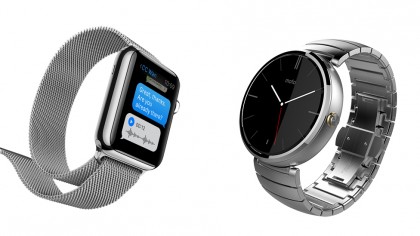
Apple Watch vs Android Wear wrap-up
Five years from now, Apple Watch and Android Wear watches are going to look as advanced as sun dials. There's room for vast improvement beyond these first versions.
That's good news because neither is good enough yet. Smartwatches are often criticized for being rather useless; there needs to be a stronger reason for people to buy into a wrist-worn smartphone accessory.
- Price breakdown: how much each Apple Watch costs
Battery life needs to go way up, while prices need to go way down. That's going to be a major challenge, as people demand embedded GPS chips for runs and other power-hungry specs.
Of course, Pebble Time and Pebble Time Steel sequels may just catch up with better specs of its own in that time and give Apple and Google a challenge from a different direction.
- Dark horse in the watch competition: Apple Watch vs Pebble Time Steel
